Travel has changed a lot in recent years, and automation is one of the biggest drivers behind this shift. Booking, reconfirmation, and cancellation three everyday tasks in the industry are being transformed by technology. When done right, automation doesn’t just streamline operations, it also makes life a lot easier for travelers. In this post, we’ll walk through how automating these three flows can improve efficiency and enhance customer satisfaction across the board.

Every journey whether it’s a business trip or a holiday relies on a few critical steps. Automating these steps helps create a smooth experience for travelers and less manual work for businesses. The key processes are:
Some recent reports show that travel companies using automation across all three areas have seen big improvements. Efficiency goes up by more than a third, and booking errors are cut down by nearly 40%.
Booking a trip today involves a lot more than just filling out a form. Modern booking systems are pretty advanced and can do a few smart things:
It’s no surprise that a lot of people like traveling but don’t enjoy booking it. A study by TravelPort found that only a quarter of travelers enjoy the booking process. That’s why automation here is such a big deal.
Reconfirmation isn’t glamorous. It’s not what travel companies put on billboards or highlight in pitches. But quietly, behind the scenes, it solves a problem that’s been frustrating travelers and agents for years mismatched bookings. You know the scenario: someone shows up at a hotel, confident their room is reserved, and the front desk says, “Sorry, we don’t have you on file.” That’s exactly what this process is meant to catch.
Modern systems do this better than any human could. A few standout features:
Here’s the kicker: in January 2025, a company called Custom Travel Solutions rolled out an AI reconfirmation system that took over this entire process. It was verifying over 4,000 bookings a day, error-free, and it slashed booking mistakes by a whopping 87%. No more last-minute panics. Just smooth travel.
Let’s be honest cancellations used to be a pain. For travelers, for companies, for everyone. But the industry has changed. People expect flexibility. And companies that treat cancellations as a chance to show empathy and keep customers happy are the ones winning right now.
What does automation bring to the table?
One company Evolve Vacation Rentals leaned into this idea hard. They didn’t just automate the cancellation; they rebuilt the whole experience around flexibility. The results? 50% more bookings, happier customers, and way better conversion rates on platforms with “free cancellation” filters. It turned what used to be a loss into one of their strongest selling points.
Automation isn’t just about plugging in a tool and letting it run. To actually make it work especially when we’re talking about bookings, reconfirmations, and cancellations you need a solid foundation under the hood. That means your systems have to talk to each other, react in real time, and stay rock-solid secure.
Travel moves fast, but trust takes time. You earn it by protecting customer data every step of the way even the parts no one sees.
Automated booking isn’t just faster it converts better. Here’s what companies are seeing once they get it right:
A 2024 market analysis showed something even more striking: companies with fully automated booking flows were pulling in 36.17% higher profit margins than those stuck in semi-manual mode.
This is the quiet MVP of automation. When reconfirmations are automated properly, the whole system runs cleaner. Some big wins:
Custom Travel Solutions’ January 2025 rollout wasn’t just about efficiency it gave their team peace of mind. The tech became a kind of safety net, catching problems before customers ever noticed.
Cancellations aren’t going away. But now they don’t have to equal lost revenue or churn.
Evolve Vacation Rentals turned a weak point into a superpower and the results speak for themselves.
The problem:
Thousands of manual calls. Tons of booking errors. Constant “no record found” issues.
The fix :
AI voice tech that handled confirmations automatically calling, verifying, and logging without agent help.
The outcome :
The problem:
Guests needed flexibility. Owners needed security. Cancellations were a mess.
The fix :
A smart cancellation system that enforced fair rules but gave travelers real options rebooking, credits, and forgiveness where it mattered.
The outcome :
Start where the journey starts. Before you automate anything, take a hard look at how your current flow works.
This is where a lot of trust gets won or lost.
This part often breaks silently. Fix it visibly.
Everything should talk to everything.
Disjointed flows lead to messes. Connected ones run smooth.
If there’s one thing the last few years have taught us in travel, it’s this things move fast. Customers expect stuff to work, instantly. That’s why automation isn’t optional anymore.
The companies leading today? They treat booking, reconfirmation, and cancellation as one flow not three jobs. Their systems are tight. Their automation is smart. And their people are freed up to do what machines can’t.
The gap between the companies doing this well and the ones dragging their feet is only getting wider.
The future of travel belongs to those who treat the whole journey as one and make it seamless.
Travel automation refers to the use of technology, such as AI and robotic process automation (RPA), to streamline and optimize travel-related processes. By automating tasks like bookings, reconfirmations, and cancellations, travel businesses can reduce manual errors, enhance customer experience, and improve operational efficiency. For instance, automation can handle repetitive tasks, allowing staff to focus on more strategic activities.
Automated booking reconfirmation systems use AI-driven tools to verify reservations with service providers, such as hotels or airlines, without human intervention. These systems can mimic human interactions, ensuring that bookings are confirmed accurately and promptly. This reduces the risk of overbookings or missed reservations, enhancing customer trust and satisfaction.
Yes, automation can manage cancellations by processing requests, updating inventory, and initiating refunds or credits as per the company's policies. Automated systems can apply smart rules based on context, ensuring that cancellations are handled fairly and efficiently, which can lead to improved customer retention.
Implementing automation can present challenges such as integrating with existing systems, ensuring data security, and managing change within the organization. It's crucial to have a clear strategy, choose the right technology partners, and train staff adequately to overcome these hurdles and maximize the benefits of automation.
Automation enhances customer experience by providing faster response times, reducing errors, and offering personalized services. For example, AI-powered chatbots can handle routine inquiries, and automated systems can ensure timely updates on bookings and cancellations, leading to higher customer satisfaction.

Travel Automation Expert